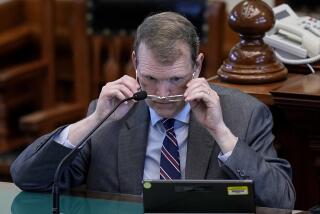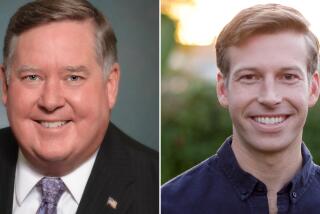Lobbyist in Robbins Case Admits Fault
- Share via
SACRAMENTO — Former lobbyist Clayton R. Jackson conceded Thursday that he had many opportunities to tell the FBI about an alleged $250,000 extortion attempt by former state Sen. Alan Robbins, but that he chose instead to protect his clients from the powerful senator.
“In retrospect, it was a terrible mistake, I will admit that; otherwise I wouldn’t be here talking to you,” said Jackson, whose lobbying firm was among the most influential and profitable in the Capitol. Instead, Jackson said, he was focused on blocking workers’ compensation insurance legislation that would have hurt his insurance clients.
Jackson, 50, is accused of 10 counts of racketeering, money laundering and conspiracy. His co-defendant, former state Sen. Paul B. Carpenter, 65, is charged with 11 counts of mail fraud, money laundering and conspiracy.
Robbins pleaded guilty to corruption charges and resigned his office in 1991 and became a government informant. He is the star witness against the two men. A San Fernando Valley Democrat who for a decade headed the Senate’s Insurance, Claims and Corporations Committee, Robbins secretly taped conversations with Jackson over a four-month period in 1991.
Prosecutors say the tapes show Jackson tried to bribe Robbins; Jackson says Robbins tried to extort money from him.
The trial’s 15th day provided the federal government’s first opportunity to question Jackson, and the cross-examination was punctuated by repeated clashes between Assistant U.S. Atty. John Vincent and Jackson.
At one point, Jackson said his business clients in 1991 donated between $400,000 and $500,000 in campaign contributions. Jackson, however, denied that the money gave him any power, saying power in the Legislature is limited to lawmakers who can vote on measures.
“If you buy a vote, it gives you power,” insisted Vincent.
“I wouldn’t know,” Jackson shot back, “I’ve never bought one.”
Vincent spent much of the day guiding Jackson through excerpts of conversations Robbins secretly recorded.
During one critical meeting on July 10, 1991, Jackson said switching jurisdiction of workers’ compensation issues to Robbins’ committee was of “immense importance.” Robbins asked him to quantify the importance and Jackson responded by saying it was worth “maybe a quarter,” meaning $250,000.
Citing this exchange, Vincent accused Jackson of dealing in “the currency of corruption.” But Jackson contended that he was merely trying to put off Robbins by making up a story about trying to raise the $250,000 from an association of workers’ compensation insurance firms.
“All politics is one big act,” Jackson said, explaining that he was trying to protect himself and his clients from Robbins, who as chairman of the Insurance Committee had great power to kill bills sought by Jackson’s clients.
The prosecutor peppered Jackson with questions about why he did not contact authorities and why he continued to talk to Robbins if he believed the legislator was committing crimes.
Besides the alleged extortion, Vincent cited several other exchanges with Robbins that Jackson failed to report to authorities. One was a 1990 meeting between Jackson and Robbins at the lawmaker’s Encino home at which Robbins asked Jackson not to say anything if questioned by a grand jury about campaign contributions.
Another example revolved around efforts by Robbins to derail the appointment of George O’Connell as U.S. attorney in Sacramento. The office has prosecuted the political corruption cases in the Capitol.
Vincent also noted that in 1991, Jackson was preparing for a potential FBI investigation.
Under questioning, Jackson said that before his Sacramento office was searched by FBI agents in November, 1991, one of his partners prepared a memo instructing employees how to behave if their offices were raided.
The memo, Jackson said, urged that “everybody be quiet and call a lawyer.”
Jackson, a 6-foot-6, 300-pound attorney, also said he was scared of Robbins, particularly after one encounter when Robbins was seeking help to stop O’Connell’s appointment as U.S. attorney.
Jackson said that in April, 1991, after talking to Republican political consultant Sal Russo, he told Robbins there was nothing that could be done to block the appointment.
In return, Jackson said he “got the evil eye” from Robbins. He refused to try to imitate Robbins but described it as the “look of pure evil, as black as could be . . . he frightened me to death.”
Vincent asked whether the physically imposing Jackson really feared Robbins, who is six inches shorter and 130 pounds lighter. “You can be frightened by all kinds of things . . . apart from physical girth,” Jackson answered.
More to Read
Get the L.A. Times Politics newsletter
Deeply reported insights into legislation, politics and policy from Sacramento, Washington and beyond. In your inbox twice per week.
You may occasionally receive promotional content from the Los Angeles Times.










